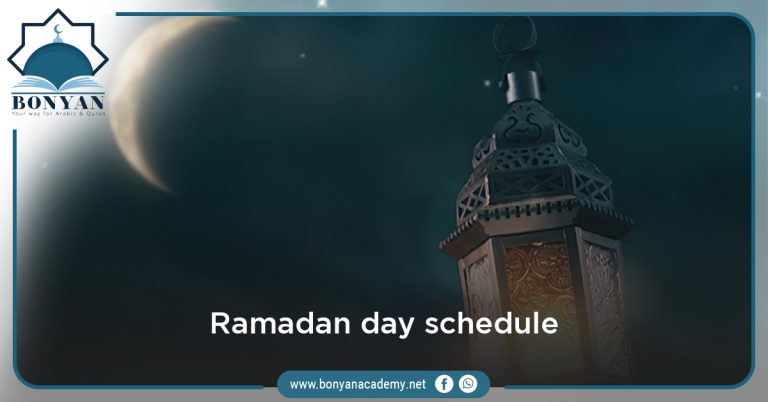Ramadan can be a challenging month for many Muslims, especially for workers and university students. As they have to prepare meals beforehand and customize Ramadan day for worship and daily Tasks.
Also, some of us are still trying to adapt to these new regulation changes. So we should maintain good physical and mental health during these days.
So the first thing to achieve this is trying to have a fixed Ramadan day routine, and in this article, we will discuss important tips for an effective and productive Ramadan routine.
Ramadan day 2023

Ramadan is the ninth month of the Muslim calendar, and it is a holy month for all Muslims around the world, in which Muslims fast, and do more worship and prayer.
The month of Ramadan is considered to be the most pious month because this is the month in which the Quran was revealed to the prophet Muhammad peace be upon him.
Also, it is the month that contains in it the night of decree ( Laylatul Qadr), which is better than the worship of a thousand months.
Months in the Muslim calendar are determined by the sighting of the crescent moon and are thus not fixed. They can be either 29 or 30 days long. However, the calendar tends to shift back ten to 12 days each Gregorian year.
Ramadan day date 2023 is expected to be on the evening of Wednesday 22 March Insha’Allah, lasting for 30 days and will end on Friday 21 April 2023. May Allah bring this month with blessings and mercy to all Muslims around the world.
Ramadan day schedule 2023

Ramadan is the time when you can be closer to Allah with clear intention and faith, leaving bad habits and reforming yourself to be a better version.
For that reason, it is important to schedule your Ramadan day to be able to make out the most of it without regretting anything later. So you can schedule your Ramadan day while observing the five daily prayers as follow:
- The time of Dawn (Fajr)
This time is the most refreshing time of Ramadan day for most Muslims, so many prefer to stay awake until Fajr, while others are napping especially those who have work or school the next day in the morning.
Usually, at this time, people tend to have a small meal called Suhoor or the pre-dawn meal. Muslim spend this time preparing a dense nutrient meal that will be enough for the long day of Ramadan.
So try to eat a meal with a low glycemic index like Oatmeal, which is ideal to keep your blood sugar levels. Also, you can have dates which are a rich source of many nutrients providing a high level of energy.
Generally make sure to eat nutritious food which contains protein, vitamins, and fats, and don’t forget sugar to make sure you have enough calories for the fasting hours.
After having Suhoor and doing Fajr prayer, you can recite portions of the holy book the Quran, and make some Dua. And now you can get some sleep before starting the next Ramadan day.
- The time of afternoon (Duhur)
This time is the most productive time of Ramadan day, which most people spend at work or completing school work tasks.
On the other hand, you can do your daily household chores like washing the dishes, mopping, and sweeping. But don’t overload yourself with chores, and just try to make your house clean to complete your day without stress, improve your overall mood and enhance your performance.
- The time of late afternoon of Ramadan day
During this time of Ramadan, most people finish their work and school tasks for all students. So this can be the time to achieve Ramadan goals from praying, making Dua, and reciting some pages of the holy Quran.
Fasting requires us to refrain from any temptation, so during this time try to detox your body, mind, and soul. Also, try to spend this time of Ramadan in self-reflection. So you can determine which part of you needs to be improved or maintained in your life.
Also, you need to set aside some time from social media, and other related stuff, and make your time dedicated to Allah S.W.T.
- The time of Maghrib (Iftar time)
This time of Iftar is the most blessed time of Ramadan for all Muslims in which they break their fasting with an Iftar meal which should be rich in protein, carbohydrates, and electrolytes.
You can start this meal with some dates and milk, then with some fresh fruit. After that, you can start having the main meal of Iftar.
Usually, fasting increases your appetite for sweets and fried food, so try not to overeat these unhealthy foods to avoid being lazy for the rest of the day.
But you can have some dates covered and stuffed with dark chocolate which will be a great source of energy. You can also try some yogurt with honey.
- The time of Isha ( late evening of Ramadan day)
After you have rehydrated your body and gotten enough food at Iftar, now it is time to prepare for a night full of worship.
At this time of Ramadan day, you can perform the Taraweeh prayer after Isha at the local Masjid or mosque, listen to the recitation of the holy Quran, and take your time to understand the meaning of the Quran.
Taraweeh is a prayer that is performed exclusively on the nights of the Holy month of Ramadan. It is performed just after the last salah of the day (Isha), and it begins on the night before the first day of fasting and ends on the night before the last day of fasting, but it is not performed the night before Eid al Fitr.
And by that, you can schedule your Ramadan day easily, and you can achieve all your Ramadan goals no matter how busy you are. So we can make the most of the holy month of Ramadan by following these few effective tips.









